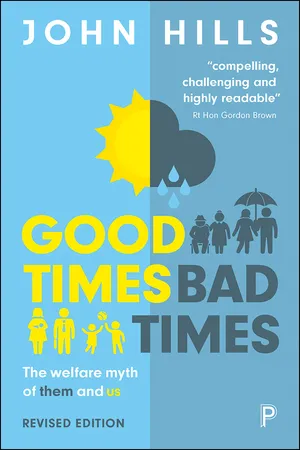
- 352 pages
- English
- ePUB (mobile friendly)
- Available on iOS & Android
About this book
Two-thirds of UK government spending now goes on the welfare state and where the money is spent – healthcare, education, pensions, benefits – is the centre of political and public debate.
Much of that debate is dominated by the myth that the population divides into those who benefit from the welfare state and those who pay into it – 'skivers' and 'strivers', 'them' and 'us'.
This ground-breaking book, written by one of the UK's leading social policy experts, uses extensive research and survey evidence to challenge that view. It shows that our complex and ever-changing lives mean that all of us rely on the welfare state throughout our lifetimes, not just a small 'welfare-dependent' minority.
Using everyday life stories and engaging graphics, Hills clearly demonstrates how the facts are far removed from the myths. This revised edition contains fully updated data, discusses key policy changes and a new preface reflecting on the changed context after the 2015 election and Brexit vote.
Frequently asked questions
- Essential is ideal for learners and professionals who enjoy exploring a wide range of subjects. Access the Essential Library with 800,000+ trusted titles and best-sellers across business, personal growth, and the humanities. Includes unlimited reading time and Standard Read Aloud voice.
- Complete: Perfect for advanced learners and researchers needing full, unrestricted access. Unlock 1.4M+ books across hundreds of subjects, including academic and specialized titles. The Complete Plan also includes advanced features like Premium Read Aloud and Research Assistant.
Please note we cannot support devices running on iOS 13 and Android 7 or earlier. Learn more about using the app.
Information
Table of contents
- Cover
- Title Page
- Copyright
- Contents
- Dedication
- List of figures
- Glossary and acronyms
- Acknowledgements
- Preface to revised edition
- 1. Introduction: ‘Them and us’
- 2. Are the poor too expensive? Redistribution and the welfare state
- 3. The long view: Social policies and the life cycle
- 4. It’s complicated: High frequency living
- 5. Good years, bad years: Reacting to change
- 6. The long wave: Wealth and retirement
- 7. The longest wave: From generation to generation
- 8. A moving backdrop: Economic crisis, cuts, growth and ageing
- 9. Conclusion: Britain’s misunderstood welfare state
- Endnotes, figure sources and figure notes
- References